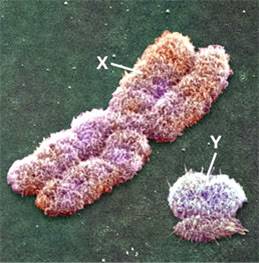Chromosomal theory of heredity.The chromosomal theory of heredity. Genetics of sex
It is known that the chromosomes of one homologous (similar) pair are similar to each other, but this is not true for all pairs of chromosomes. When comparing chromosome sets of asexual cells of female and male sexes in one pair of chromosomes, differences are found, although one of the sexes has the same chromosomes. They are called X (x) chromosomes. The other sex has one X chromosome, and the other is different in structure. It is called the Y chromosome. This pair is called sex chromosomes, and all pairs of chromosomes are identical in male and female individuals - autosomes. Sex (X and Y) chromosomes differ not only in morphology, but also in the information they contain.
The combination of sex chromosomes determines the sex of the organism. Female cells contain two X chromosomes (X). Male cells contain one X and one Y chromosome (XY).

The gamete of the human female body is the egg. In the process of ovogenesis (for mation of an egg), the egg always contains an X chromosome. The gamete of the male organism is the sperm, which is formed during spermatogenesis and may contain the X or Y chromosome. During fertilization, a female egg and a male sp erm merge. Accordingly, the X chromosome during fusion is combined with the other sex chromosome from the sperm - e ither X or Y. When the gamete (an egg in women and a sperm in men) of the mother's X chromosome fuses with the gamete of the father's X chromosome, a zygote (a structure formed during gamete fusion and giving rise to a new organism) with two X chromosomes (XX) is formed, which gives rise to female orgasm. If the mother's gamete with an X chromosome fuses with the father's gamete with a Y chromosome, a zygote is formed that contains one X and one Y chromosome (XY), respectively, giving rise to male oranism. |